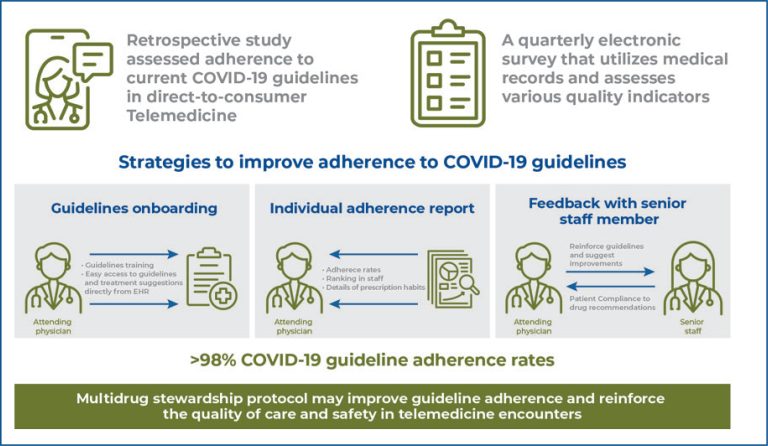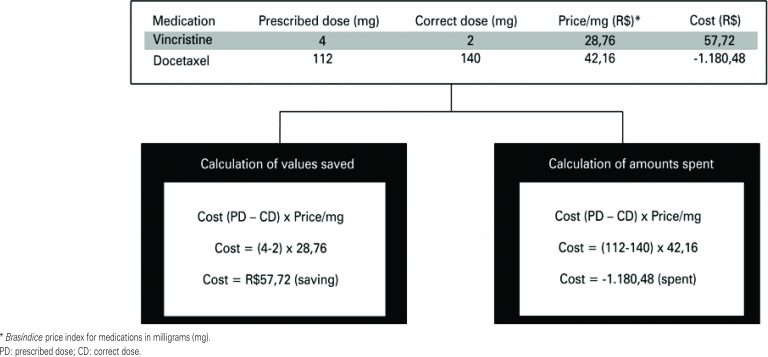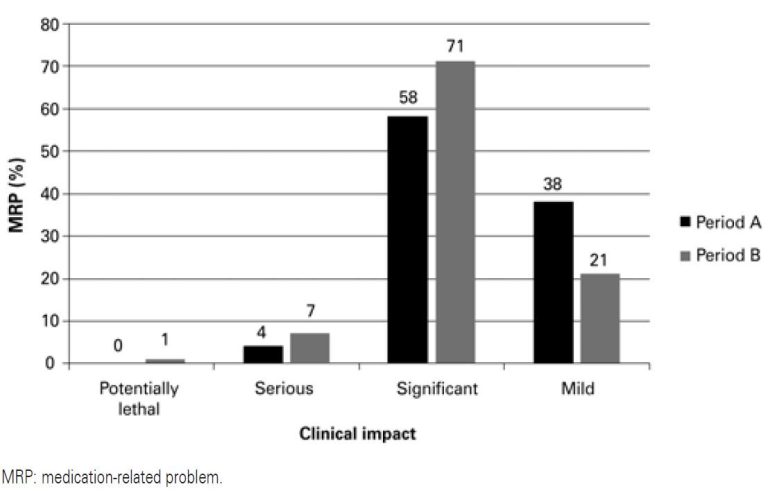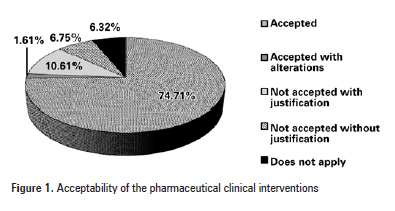24/Jun/2024
Multidrug stewardship and adherence to guidelines in >200,000 direct-to-consumer Telemedicine encounters
DOI: 10.31744/einstein_journal/2024AO0707
Highlights Up to 75% of COVID-19 telemedicine patients receive unnecessary drugs; this highlights the need for research. This study assessed the effect of guideline training and feedback on 200,000 telemedicine visits in Brazil. Under 2% of patients with COVID-19 received non-guideline recommended antimicrobials, reflecting high adherence rates. Targeted interventions significantly enhance guideline compliance for safer telemedicine prescriptions. ABSTRACT Objective: The quality of care and safety for Telemedicine-discharged patients with suspected respiratory infections are closely related to low rates of prescriptions […]
Keywords: Communicable diseases; Coronavirus infections; COVID-19; Drug prescriptions; Guideline adherence; Patient discharge; Prescriptions; Quality Indicators, Health Care; Referral and consultation; Respiratory tract infections; Telemedicine
15/Jun/2018
Pharmacotherapeutic follow-up in a respiratory intensive care unit: description and analysis of results
einstein (São Paulo). 15/Jun/2018;16(2):eAO4112.
View Article15/Jun/2018
Pharmacotherapeutic follow-up in a respiratory intensive care unit: description and analysis of results
DOI: 10.1590/S1679-45082018AO4112
ABSTRACT Objective: To describe and evaluate the pharmacotherapeutic follow-up by a clinical pharmacist in an intensive care unit. Methods: A descriptive and cross-sectional study carried out from August to October 2016. The data were collected through a form, and pharmacotherapeutic follow-up conducted by a clinical pharmacist at the respiratory intensive care unit of a tertiary hospital. The problems recorded in the prescriptions were quantified, classified and evaluated according to severity; the recommendations made by the pharmacist were analyzed considering the […]
Keywords: Critical care; Drug prescriptions; hospital; Pharmaceutical services; Pharmacists; Pharmacy service
19/Apr/2018
Patient safety and the value of pharmaceutical intervention in a cancer hospital
DOI: 10.1590/S1679-45082018AO4122
ABSTRACT Objective To demonstrate economic impact of pharmaceutical evaluation in detection and prevention of errors in antineoplastic prescriptions. Methods This was an observational and retrospective study performed in a cancer hospital. From July to August 2016 pharmacists checked prescriptions of antineoplastic and adjuvant drugs. Drug-related problems observed were classified and analyzed concerning drug, pharmaceutical intervention, acceptability and characteristic of the error. In case of problem related to dose, we calculated a deviation percentage related with correct dose and value spent […]
Keywords: Antineoplastic agents; Drug prescriptions; Economics, pharmaceutical; Medication errors; Oncology service, hospital; Pharmaceutical services
01/Jul/2016
Implementing a clinical pharmacy service in hematology
DOI: 10.1590/S1679-45082016AO3667
ABSTRACT Objective: To implement a clinical pharmacy service focused on the comprehensive review of antineoplastic drugs used in therapy of hematological diseases. Methods: An interventional study was conducted in a Brazilian tertiary teaching hospital in two different periods, with and without a clinical pharmacy service, respectively. This service consisted of an antineoplastic prescription validation (analysis of patients’ characteristics, laboratory tests, compliance with the therapeutic protocol and with pharmacotechnical parameters). When problems were detected, the pharmacist intervened with the physician or […]
Keywords: Antineoplastic agents; Drug evaluation; Drug prescriptions; Hematologic agents; Hematologic diseases; Pharmacy service, hospital
03/Jul/2013
Analysis of clinical pharmacist interventions in a tertiary teaching hospital in Brazil
DOI: 10.1590/S1679-45082013000200010
OBJECTIVE: To analyze the clinical pharmacist interventions performed during the review of prescription orders of the Adult Intensive Care, Cardiologic Intensive Care, and Clinical Cardiology Units of a large tertiary teaching hospital in Brazil. METHODS: The analysis took place daily with the following parameters: dose, rate of administration, presentation and/or dosage form, presence of inappropriate/unnecessary drugs, necessity of additional medication, more proper alternative therapies, presence of relevant drug interactions, inconsistencies in prescription orders, physical-chemical incompatibilities/solution stability. From this evaluation, the […]
Keywords: Drug prescriptions; Hospital pharmacy; Pharmaceutical care; Pharmacy service, hospital
01/Jan/2011
Potentially inappropriate medication prescribed to elderly outpatients at a general medicine unit
DOI: 10.1590/S1679-45082011AO1844
ABSTRACT Objective: To establish the prevalence of potentially inappropriate medications prescribed for elderly patients, to identify the most commonly involved drugs, and to investigate whether age, sex and number of medications were related with the prescription of these drugs. Methods: Prescriptions for 1,800 elderly patients (≥ 60 years) were gathered from a database. These prescriptions were written by general physicians at a tertiary level university hospital in the city of Sao Paulo, Brazil, from February to May 2008. Only one […]
Keywords: Aged; Drug prescriptions; Internal medicine; Outpatient clinics, hospital; Pharmacoepidemiology
01/Apr/2010
Adverse drug events leading to emergency department visits in elderly: the role of inappropriate prescription
DOI: 10.1590/S1679-45082010AO1473
ABSTRACT Objective: Adverse drug reactions are more incident among the elderly and are frequently associated to inappropriate prescription for this group. The objective of the current study was to investigate the incidence and the characteristics of emergency department visits, related to inappropriate prescription, at the Hospital Israelita Albert Einstein. Methods: Patients aged 60 years or older, admitted to the emergency department at Unidade Avançada Ibirapuera of Hospital Israelita Albert Einstein, were included in the study. Potentially inappropriate medication for the […]
Keywords: Aged; Drug prescriptions; Emergency service, hospital; Pharmaceutical preparations/administration & dosage; Pharmaceutical preparations/adverse effects





